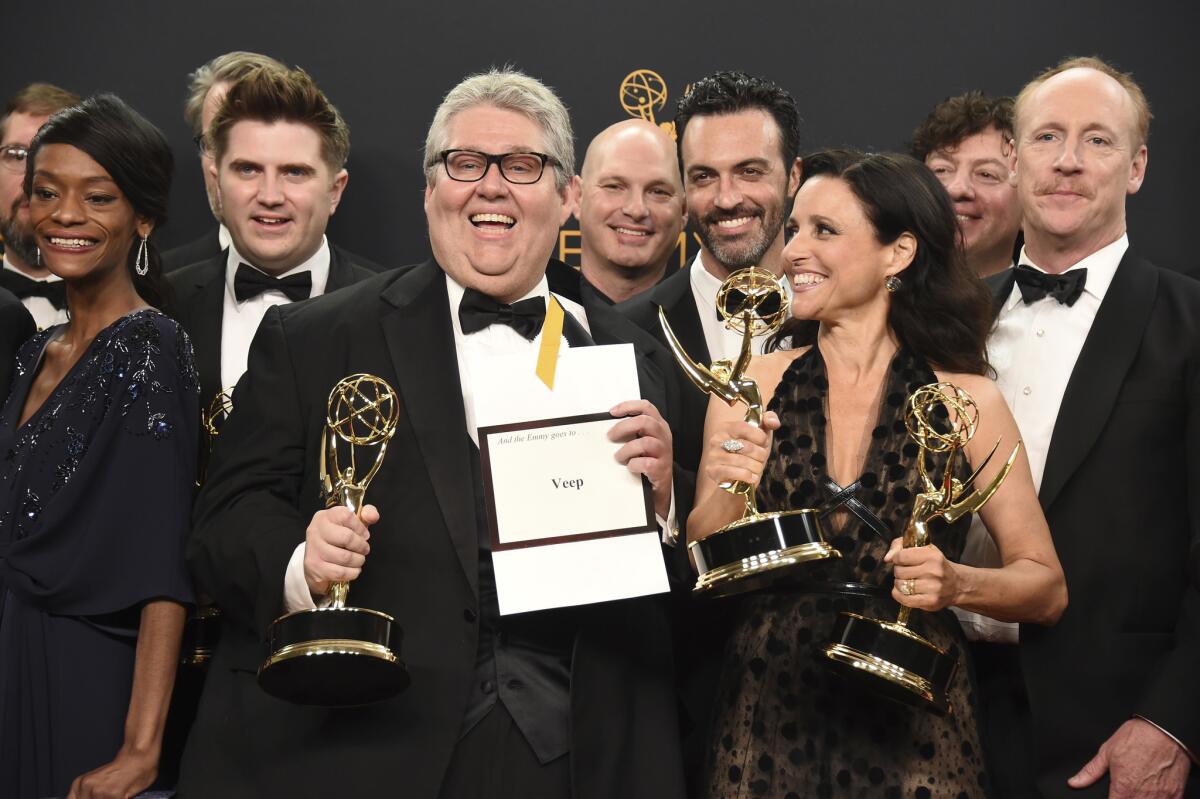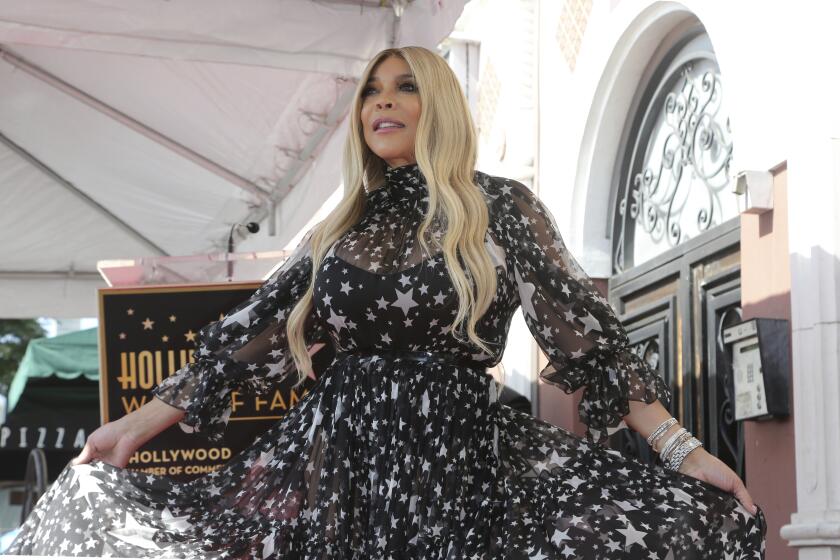When truth is stranger than fiction: TV writers weigh in on the presidential campaign
There was the “Access Hollywood” tape exposing Donald Trump’s lewd comments toward women. The barrage of WikiLeak-ed Hillary Clinton emails. And, of course, Ken Bone and his red sweater. With its seemingly daily plot twists, cliffhangers and quirky side characters, the presidential election has given new meaning to must-see TV.
Maybe it was inevitable. Trump is a reality TV star-turned-Republican presidential nominee. Clinton has celebrities including Julia Roberts and Jon Hamm supporting her as the Democratic nominee. That the process of choosing the next commander in chief would take on the sort of high-stakes pacing of a popular drama series, the buffoonery of a comedy, or the tawdriness of a lowbrow reality show makes the lead-up to Wednesday’s third and final presidential debate all the more harrowing.
We spoke to show runners of political-themed TV shows to get their thoughts on how real life is stacking up against fiction: Barbara Hall of CBS’s “Madam Secretary,” about a former CIA analyst and professor (Tea Leoni) who is thrust into the position of secretary of State (a role inspired by Hillary Clinton); David Mandel of HBO’s “Veep,” a political satire that tracks the political career of narcissist Selina Meyer (Julia Louis-Dreyfus), who briefly becomes president; and Jon Harmon Feldman of ABC’s “Designated Survivor,” about a low-level Cabinet member (Kiefer Sutherland) who becomes president after a catastrophic attack kills everyone above him in the line of succession.
--------
Could you have scripted something like this election?
Hall: I’m not nearly that imaginative. Even if we were trying to go for something with this kind of tone, we couldn’t have scripted this. Actually the whole jumping-off point of “Madam Secretary” was a place to go to talk about politics in a way that is not so polarized and polarizing. I thought it would be a nice parallel universe for people to talk about policy and everything behind the scenes of Washington so that people could be aware of how politics really work, or are supposed to work. It’s a little bit of refuge from what we’re living.
Feldman: I don’t think that we could have scripted it and had a reaction other than skepticism that anything could play out like this or anyone could behave like this. I think critics would have found it preposterous.
The most-read Entertainment stories this hour »
Mandel: It’s madness and it’s unbelievably crude. While I know a lot of people say “Veep” is occasionally crude, I certainly like to think that we are artfully crude. Most likely we’d all be fired if we wrote a 10th of what has happened thus far. In some ways, this year’s election has become some sort of insane single-camera comedy. It comes complete with guest roles, like Ken Bone. We could call the comedy “Misery.”
Does the insanity of it make your job harder?
Mandel: Honestly, it makes everything harder. I couldn’t be happier that [Selina Meyer] is out of the White House on our show and we’re moving on to the next phase of her career.
I’ve never said this before. We had a scene where a minor character gets picked up on a DUI and he’s being a little mouthy to a female police officer and we sort of had a run using [the P-word]. It was pretty funny and they basically threw it in the garbage. [Trump] is ruining comedy.
One of the fun things about Selina Meyer is that while she is wonderfully sort of power hungry, and obviously she has great street fighting sense, she has surrounded herself with incompetence. And some of the fun of her existence is the incompetency at the job. Yet none of those things we do [on “Veep”] seem quite as incompetent as running for president and knowing that you had a video of you harassing women out there. What we used to do was sort of like funny incompetence, and this is just sort of sad, scary incompetence.
Feldman: The presidential campaign is almost playing out like a reality show, and the appeal of reality is that you’re drawn to larger-than-life characters in an aspirational sense, and you’re also repulsed by them and therefore are able to feel somehow morally superior to them.
In a way, I think the fascination of someone like Trump is the reality show aspect of him as a candidate.He’s this wealthy famous person who also does things that are abhorrent to half the population. As writers we’re trying to explore characters who are grounded and human and complex, and hopefully making the right decisions, although struggling with how to attack problems. We’re trying to imbue them with a nuance that I don’t think many people would say that Trump currently seems to possess.
And in what ways does it create opportunity?
Mandel: One of the good things for us is there are a lot of people on both sides that are upset with this election, and for different reasons. Sometimes when you’re upset, you’re looking for a way to laugh at it. That’s a good thing for us.
What’s it like having a politically themed show during an election year?
Feldman: It offers opportunities, and it offers challenges. I think there was the question: Will people find our take on politics refreshing in the face of the real campaign or would they have a degree of political fatigue?
What I strongly suspect is that politics in real life and politics in television or film are not necessarily equated. I don’t think they take up the same bandwidth in our minds. One is news and one is entertainment, and people are pretty savvy about how they separate those things out.

Are you and the writers mining the debates for material?
Feldman: I think we’re having the same conversations that many people are having, which is, wow, did that just happen? Because I think real life is playing out in such a, for lack of a better word, dramatic or sensational way, the irony is real life doesn’t feel real. So our job as writers is to try to, the best we can, make it seem entertaining and also, to some degree, real as well.
Hall: There are two different tracks. We talk about everything as people who are engaged in the election, but then when it comes to talking about our world, it’s a completely different discussion. One thing that’s interesting for us this year is we’re doing a parallel election. Part of what we really like to do is pull the curtain back on process and see into intricacies of the political process that [viewers] might not know about.
Mandel: We talk about it all the time. I do think we find ways of folding in things. We won’t be tackling it in the realm of an election cycle, but there are big issues that have revealed themselves—certainly over the last eight years, but even more during this election--that we’ll be addressing.
What are some of the themes from the election that you hope to explore?
Mandel: The levels of racism, and sort of anti-Muslim attitudes that we’re seeing in all of these places.
In some ways, we’re ahead of the election. We had a story line last season where there were running jokes about the pronunciation of Nevada. And just [recently], Trump went on stage and pronounced it wrong like six times. We did that. (Louis-Dreyfus tweeted a montage of Trump’s pronunciation gaffes with clips from the show depicting her character, flubbing the state’s name in the same fashion.)
Hall: The theme, if anything, we are exploring is mostly just presenting an aspirational election. This is how we want it to go and wish it could go, but it does have a drama in it.
Feldman: We’ve explored episodes that involved the treatment of American Muslims at the hands of a governor and how that falls on the White House to combat what seems to be institutionalized racism.
How does what you’ve seen play out this election cycle get you thinking about what it means to be presidential?
Feldman: Our show has a degree of wish fulfillment in that it starts with the premise of a man who has no business being president who is suddenly thrust into this role. For all his naivete and doubts and fears and inexperience, there’s something inherently presidential about him. That’s partially the character and partially the way Kiefer embodies him. We like the idea that the country in our show is being led by a man who, although he hasn’t prepared for this, somewhere deep down has the traits that make him an effective leader.
For us, his growth curve over the course of the series — and it’s not always a straight line — but he’s a guy who we believe takes office and will try to make the right choices for the right reasons. But eventually as expediency creeps into the job, and as he battles the forces that make his job harder, the question will arise: Will he make the right choice for the wrong reasons?
Mandel: While she’s [an] incredibly smart person I do not think Hillary’s the greatest campaigner perhaps. She’s not the most natural person among the electorates. I love that ‘Oh, I’m comfortable’ persona that she has sometimes. I see elements of Selina there, which is enjoyable for us. I’m fascinated how over these last couple of years, that intellectualism is seen as a bad thing. Being smart is often seen or judged as a negative.
This, to me, is one of the smartest, most capable people that ever ran for office — arguably she has more experience than her husband or President Obama than when either of them were elected to the office. Yet somehow people don’t like her, and I have to admit I don’t like it, but I’m fascinated by it.
What has been the most TV-like moment in this election cycle?
Mandel: The funniest moment to me— I want to reach back to that Republican debate where Ben Carson got lost and kind of stood there and the other candidates kept coming out and were trying to help him. That’s the kind of thing that is funny and good and resonates.
There are definitely worse days. The day the “grab ‘em by the …… ” tape came out, if you go back and look at the various writers’ Twitter accounts, myself included, there’s like 20 different tweets. Just jokes about it and whatnot. Honestly, sometimes we finish a take and the first question is ”What happened? Did Trump do anything?” It’s like that. “Oh my God Billy Bush just got fired.” It doesn’t stop.
Feldman: Every time you think you’ve seen the most sensational moment, a new one comes along. I’m going to say whatever happens next is the most TV moment.
It’s like sweeps.
Hall: Exactly. It has that feel. The way it keeps getting more and more insane as we approach election day is pretty television-like. It has never been our goal to top what’s really going on in the world. If we were, we couldn’t.
Twitter: @villarrealy
ALSO:
Khloe Kardashian fires back at ‘cruel’ Donald Trump remarks
Michael Moore to release surprise Trump film in L.A. on Wednesday
Roger Waters takes aim at Donald Trump and gives Desert Trip a volatile conclusion
More to Read
The complete guide to home viewing
Get Screen Gab for everything about the TV shows and streaming movies everyone’s talking about.
You may occasionally receive promotional content from the Los Angeles Times.







